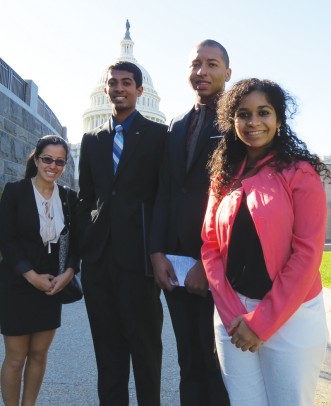Representing student issues on Capitol Hill

UIC students on a recent trip to lobby in Washington, D.C.: student trustee Danielle Leibowitz (from left), and student government members Abhi Reddy, Brandon Gaskew and Priya Uppuluri.
By Danielle Leibowitz
When I took my first trip to Washington, D.C., last year I was inspired by how much of an impact students can have on their world.
I decided to lead my own trip this year to discuss issues relevant to the students I represent as UIC’s student trustee, as well as students across the country.
On this trip, Undergraduate Student Government president Abhi Reddy, secretary Priya Uppuluri, committee chairman Brandon Gaskew and I met with members of Congress to discuss three main issues.
One key issue was the importance of maintaining funding for the Pell grant, which is a federally issued grant that about 50 percent of UIC students receive. Many receive the full amount of $5,645 per year; the average recipient receives about $4,600.
One of the reasons Pell grant funding is particularly relevant now is that it is threatened to be cut under sequestration — mass budget cuts made due to federal debt. While there were no cuts made this year, the budget for federal work-study has already taken a hit, and this may or may not happen to the Pell grant next year, which would lower the maximum amount by about $300.
Another issue we discussed was the need for comprehensive immigration reform, with an emphasis on finding a way for undocumented students to find work after they graduate. Because there is a notable population of students at UIC who are undocumented — and there are many students across the country who were brought here at a young age, went through school and now are unable to be employed due to their undocumented status — we advocated for federal legislation that would allow these individuals to work in the U.S.
Our last main point was centered on funding for science, technology, engineering and mathematics (STEM) education and research. STEM is a hot topic right now because of how our world is shifting in a direction where skills in areas such as technology are necessary to keep up and get ahead. But that means providing an education that will get give people those skills.
This is where STEM ties to our other two points because students cannot get the education they need if they cannot afford it, and it’s a waste if we have individuals who finish their education — possibly in a STEM discipline — but are unable to work because of their status.
After hearing about these issues, some of you may be thinking, “How can I help to continue these efforts?”
If that’s you, let me share this brief story.
We met with an intern from Illinois Congressman Bobby Rush’s office and I asked him the same question. What he shared seem obvious, but it’s something that I think is often overlooked by students. He said that Rush votes how his constituents tell him to.
When I asked about how often he hears from students, he said hardly ever, and that it’s usually older people that call, which he said is why funding for things such as Medicare stay strong.
Now think back to Pell grant funding, research funding or any federal funding that you or someone you know receives that is in danger of being cut. If you want to do something about it, you don’t have to take a trip to Washington, D.C.
Having your voice heard is as simple as writing a letter or calling your legislator’s office.
After taking two trips to D.C., I can tell you that legislators are happy to hear from students.
If you have any questions about this process, I would be happy to help. Email me at dleibo2@uic.edu
• Danielle Leibowitz, an Honors College student majoring in the teaching of mathematics, is UIC’s student member of the University of Illinois Board of Trustees.
